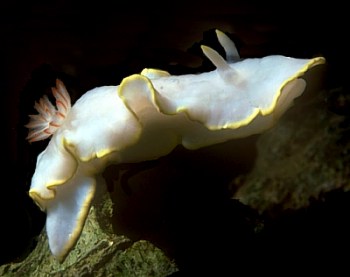
Glossodoris undaurum
Rudman, 1985
Order: NUDIBRANCHIA
Suborder: DORIDINA
Superfamily: EUDORIDOIDEA
Family: Chromodorididae
DISTRIBUTION
Southwestern Western Australia, east coast South Africa. (See message below).
PHOTO
Transits Reef, Rottnest Is, Western Australia, March 1982, approx 40mm long alive. PHOTO: G. Saueracker.
The mantle is translucent white with many large opaque blotches all over, except around the edge which has a broad band of opaque white with a thin yellow band right at the edge. The rhinophore stalk is transparent and the club is opaque white with a yellow dash along the upper part of the anterior and posterior midline of the club. The simple gills are translucent white with red lining the inner and outer edge of each gill. The underside of the animal is white, somewhat more opaque around the edge of the foot which is bordered with a yellow line.
The animal is relatively high, the mantle clongately oval with the broad overlap thrown into a series of folds down each side, with a particularly prominent fold on each side halfway down the body. The gills are simple, and arranged in an arc open posteriorly, each end spiralling up into an internal secondary arc on each side. No information is available on whether the gills are waved rhythmically.
Glossodoris undaurum is one of a group of chromodorids which are white with a yellow border which I have previously grouped together for identification purposes as the Chromodoris aureomarginata colour-group. Only a few of those species belong to the genus Glossodoris. Glossodoris pallida has distinctive white markings on the mantle and the mantle border of Glossodoris electra is a wide golden yellow band and the gills and rhinophore clubs are a brownish colour. Glossodoris undaurum is distinguished by the red-lined gills, yellow tipped rhinophores, and the opaque white patches which are usually visible all over the mantle.
References:
•Rudman, W.B. (1985) The Chromodorididae (Opisthobranchia: Mollusca) of the Indo-West Pacific: Chromodoris aureomarginata, C. verrieri and C. fidelis colour groups. Zoological Journal of the Linnean Society 83: 241-299.
•Rudman, W.B. (1986a) The Chromodorididae (Opisthobranchia: Mollusca) of the Indo-West Pacific: The genus Glossodoris Ehrenberg (= Casella, H. & A. Adams). Zoological Journal of the Linnean Society 86(2): 101-184.
•Rudman, W.B. (1990b) The Chromodorididae (Opisthobranchia: Mollusca) of the Indo-West Pacific: further species of Glossodoris, Thorunna and the Chromodoris aureomarginata colour group. Zoological Journal of the Linnean Society, 100(3): 263-326.
Rudman, W.B., 1999 (November 8) Glossodoris undaurum Rudman, 1985. [In] Sea Slug Forum. Australian Museum, Sydney. Available from http://www.seaslugforum.net/find/glosunda
Related messages
Glossodoris undaurum from Western Australia
March 26, 2004
From: Adrian Baddeley

Dear Bill
I'd just like to confirm that this is Glossodoris undaurum.
We saw it on 25 February 2004 at Jackson Rocks, at the eastern end of the south side of Rottnest Island in about 15 metres. The site is a broken-up wall of limestone [off Perth, Western Australia].
Cheers
Adrian Baddeley
adrian@asteridia.maths.uwa.edu.au
Baddeley, A. , 2004 (Mar 26) Glossodoris undaurum from Western Australia. [Message in] Sea Slug Forum. Australian Museum, Sydney. Available from http://www.seaslugforum.net/find/12554Dear Adrian,
Yes this is Glossodoris undaurum, Your photo shows the opaque white patched on the mantle much better than the one photo we have on the Forum from Western Australia.
Best wishes
Bill Rudman
Glossodoris undaurum from Sth Africa
November 8, 1999
From: Valda Fraser

Dear Bill,
Has the Glossodoris mentioned in Gosliner, T. 1987 NUDIBRANCHS OF SOUTHERN AFRICA. Sea Challengers,- Glossodoris sp 1, page 84) been named? It looks the same as the specimen Glossodoris undaurum(page 227) in Debelius, H. 1996. This nudibranch occurs in the area where I live.
Locality: South Coast KwaZulu/Natal - SOUTH AFRICA. Near Port Shepstone, Rocky reef, 15m, October 1999. Size: 66mm
Regards
Valda Fraser
iti04937@mweb.co.za
Dear Valda,
Yes I think your animal is Glossodoris undaurum. The white patches are not that clear in the photo I have posted above, and the yellow border in your photo doesn't seem as distinctive.
A comparison of the anatomy of the two would be required to be certain, but it certainly looks as thought this species is on both sides of the Indian Ocean. Terry Gosliner may be able to confirm this for us.
Best wishes,
Bill Rudman.
